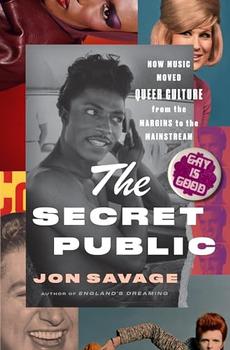
How Music Moved Queer Culture From the Margins to the Mainstream
by Jon Savage
A monumental history of the gay influence on popular culture, from the rise of Little Richard to the collapse of disco in 1979.
Award-winning author Jon Savage takes us on a fast and captivating journey through the history of pop music as seen through the eyes of queer artists.
Jon Savage, the author of the canonical England's Dreaming, explodes new ground in this electrifying history of pop music from 1955 through 1979. In demonstrating that gay and lesbian artists were responsible for many of the greatest cultural breakthroughs in the last half of the twentieth century, he shows that it was their secretly encoded music―appealing to a closeted but greatly oppressed public―which led to the historic dismantling of discriminatory gay laws and the fusion of queer and straight culture.
Fittingly, Savage's kaleidoscopic work begins with the pomp-and-pompadour appearance of Little Richard, whose relentlessly driving sound, replete with gospel shrieks and sexual contortions, enthralled a generation of 1950s stultified white teenagers. Things soon went mainstream, as Elvis enthralled a nation with his seductive low moans and bump-and-grind twists, heavily derivative of Black music, while James Dean and Rock Hudson became the face of 1950s Hollywood; yet this explosion of queer expression remained covert and could not be accepted for what it was.
While music, with supporting roles from cinema and fashion, became the key medium through which homosexuality could be clandestinely enacted, overt expressions of gay behavior were met with arrests and crackdowns. While hippies reveled in 1967's "Summer of Love," gays remained "harassed by police, demonized by the media and politicians, imprisoned simply for being who they were." J. Edgar Hoover, who some speculate was himself a closeted homosexual, continued to spy on homosexual deviants; CBS's Mike Wallace aired an invidious show about homosexuality; and the New York police continued to raid gay bars.
Yet the music itself produced a cultural eruption that simply could not be stanched. While Bette Midler sang "Boogie Woogie Bugle Boys" to a Continental Baths audience of 600 gay men, all naked except for towels, David Bowie "blew the whole topic wide open" and "became the most totemic pop star of his generation." Even though roadblocks remained, the gear-grinding crunch of the music signaled that the gay civil rights movement could no longer be suppressed.
Ending the narrative with the sudden collapse of disco, The Secret Public asserts then that the genie was out of the bottle, that queer culture had finally entered the mainstream, producing a transcendent vision of pop culture that could never be marginalized again.
"A keenly intelligent, comprehensive survey of some of the bravest artists in history." —Kirkus Reviews (starred review)
"This title is not merely essential for any collection on popular music or queer history. Savage's ability to turn a wealth of information into a compellingly readable narrative should make this volume of interest to readers of all stripes." —Library Journal (starred review)
"Perceptive and elegantly written, this captivates." —Publishers Weekly
"With kaleidoscopic detail and exhilarating verve, [Savage] tells the intertwined, transatlantic story of pop and the struggle for LGBTQ+ emancipation...The depth of Savage's research is one reason why this book feels so definitive. As well as hidden B-sides and underground films, he excavates long-lost gay artefacts and personalities...Savage handles his mountains of material with total authority and control, and in the course of doing so reveals the way that pop music was able not just to point the way to a more liberated existence, but also to realise dreams that had previously seemed unreachable." ―Guardian (UK)
"This is a meticulously researched tome…but Savage's central achievement is to wear all his knowledge lightly, to tell us these stories as easily and engagingly as if we were stood in line with him, waiting to go into a gig….The Secret Public is constantly in motion, spinning outwards from its glimpses of individual stars and managers into the collective story of entire nations, not just of LGBTQ+ people. Readers who come for the insights into certain schools of music, or particular singers, will also find a book that is brilliant on shifting ideas of postwar masculinity in the UK and US, and the wider cultural consumption of the era." ―The Observer (UK)
"Impressive not only in its scope and detail but also in its subtlety....The Secret Public can surely have no peers." ―Literary Review (UK)
This information about The Secret Public was first featured
in "The BookBrowse Review" - BookBrowse's membership magazine, and in our weekly "Publishing This Week" newsletter. Publication information is for the USA, and (unless stated otherwise) represents the first print edition. The reviews are necessarily limited to those that were available to us ahead of publication. If you are the publisher or author and feel that they do not properly reflect the range of media opinion now available, send us a message with the mainstream reviews that you would like to see added.
Any "Author Information" displayed below reflects the author's biography at the time this particular book was published.
Hailed by the New York Times Book Review as "the definitive history of the English punk movement," England's Dreaming established Jon Savage as one of the foremost pop culture historians of his generation. The winner of the Ralph J. Gleason prize, he lives in North Wales.
In order to become the master, the politician poses as the servant
Click Here to find out who said this, as well as discovering other famous literary quotes!
Your guide toexceptional books
BookBrowse seeks out and recommends the best in contemporary fiction and nonfiction—books that not only engage and entertain but also deepen our understanding of ourselves and the world around us.